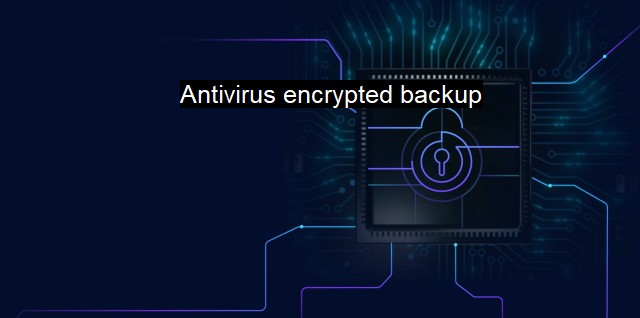What is Antivirus encrypted backup?
Antivirus Encrypted Backup: Implementing a Comprehensive Approach to Ensure Data Protection in the Complex Cybersecurity Landscape
Antivirus encrypted backup refers to a cybersecurity measure where data—and specifically backup data—is encrypted, and an antivirus program scans it to prevent the presence of any malware or harmful viruses. The broad context arises from an increasingly digital world, where it is important to have a secure online presence, protect privacy and prevent loss of essential, sensitive information.To appreciate the concept of antivirus encrypted backup, one has to first understand how encryption and antivirus software function individually before they come together to bolster security.
Encryption is a process in which a plaintext, or that is, basic data, is converted into ciphertext via the use of an algorithm. The algorithm makes it such that the data is unreadable to anyone without a decryption key, thereby creating a secure barrier around it to prevent unauthorized access. There are two primary types of encryption: Symmetric-key and Public-key encryption, including variations of both for added layers of protection.
Antivirus software, on the other hand, is a program or set of programs that exist specifically to prevent, detect, and remove all kinds of malicious software, also known as malware. They are essential for detecting viruses, but also for dealing with trojans, worms, spyware, ransomware, adware, and many more types of cyber threats.
The concept of an encrypted backup combines these two technologies. A regular backup involves creating a copy of essential data, which can later be restored in case of data loss due to hardware malfunction, system failure, hacking, or any other such concerns. regular backups, while helpful to safeguard data from loss, would still be vulnerable to cyber attacks or data breaches as accessing this data would be relatively easy for an adept hacker.
Therefore, to ensure full integrity and security of backup data, it has to be encrypted. As a result of this step, even if the backup data fell into the wrong hands, the information within it would be unreadable and useless without a decryption key.
Backup encrypted with sturdy protocols could not guarantee complete data security. Let’s say, backed data already had pre-existing malware in it. Even though encrypted and unreadable, once you accessed it with the decryption key, it would infect the primary system.
This dilemma brings the aspect of antivirus into the encrypted backup – creating the idea of an 'antivirus encrypted backup'. While the encryption guards the content of the backup data from outside attack, an antivirus check makes sure that there's no harmful entity inside.
Before backing up data, antivirus software scans every file to ensure it is free of malicious software. The data is then encrypted and stored for safekeeping in a chosen location like local backup devices, network-attached storage, or cloud-based platforms. Afterward, when it is time to restore the data, another series of antivirus scans is run to ensure no malware was introduced after the backup point.
As cybersecurity threats become more sophisticated, antivirus encrypted backups are a strategy to ensure the security of saved data against potential threats, both external and internal. It maintains the integrity of precious information and vital services, reducing downtime and losses due to attacks, breaches, or system failures. In sum, an antivirus encrypted backup is a two-pronged cybersecurity strategy involving antivirus programs eliminating potential malware from backup data, and encryption protocols protecting it from illicit or unauthorized access, both amounting to a comprehensive security measure.

Antivirus encrypted backup FAQs
What is an antivirus encrypted backup?
An antivirus encrypted backup is a type of backup that includes an additional layer of security through encryption, which makes the data unreadable to anyone without the encryption key. The backup also goes through an antivirus scan to ensure no malware is present in the files.Why is an antivirus encrypted backup important?
An antivirus encrypted backup is important because it adds another layer of protection against cyber threats, such as ransomware attacks. If malware infects your system, you can still restore your data from the encrypted backup.How do I create an antivirus encrypted backup?
To create an antivirus encrypted backup, you can use a backup software that includes encryption and antivirus scanning features, or you can do it manually by encrypting the data before backing it up and running a scan on the backup file afterward.What are the best practices for managing antivirus encrypted backups?
Some best practices for managing antivirus encrypted backups include testing the integrity of the backup periodically, keeping multiple copies of backup files in different locations, ensuring the encryption keys are stored securely, and updating the backup schedule regularly to include all new data.| | A | | | B | | | C | | | D | | | E | | | F | | | G | | | H | | | I | | | J | | | K | | | L | | | M | |
| | N | | | O | | | P | | | Q | | | R | | | S | | | T | | | U | | | V | | | W | | | X | | | Y | | | Z | |
| | 1 | | | 2 | | | 3 | | | 4 | | | 7 | | | 8 | | |||||||